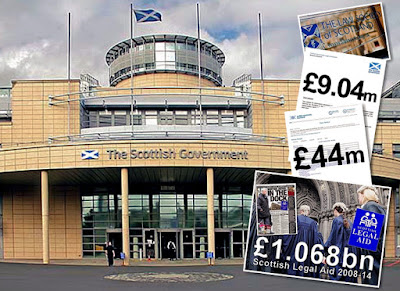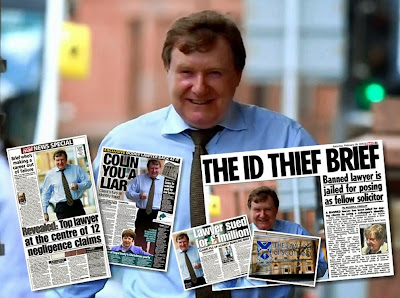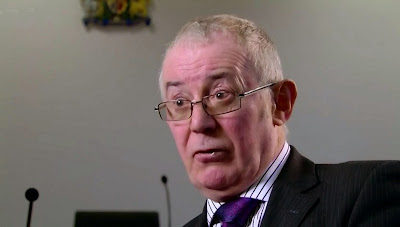 Legal establishment & judiciary to select Scotland’s new top judge. THE PROCESS leading to the eventual appointment of Scotland’s next top judge began today, almost two months after the sudden retirement of Scotland's longest serving judge - Lord Brian Gill - who served his last three years on the bench as Lord President & Lord Justice General from 8 June 2012 to 31 May 2015.
Legal establishment & judiciary to select Scotland’s new top judge. THE PROCESS leading to the eventual appointment of Scotland’s next top judge began today, almost two months after the sudden retirement of Scotland's longest serving judge - Lord Brian Gill - who served his last three years on the bench as Lord President & Lord Justice General from 8 June 2012 to 31 May 2015.
Earlier today, the Scottish Government & Judicial Office jointly announced First Minister Nicola Sturgeon has established a selection panel comprised of in-house establishment figures including senior members of the judiciary, to make recommendations to the First Minister by Friday 30 October for a new Lord President, the most senior judicial office in Scotland.
However, unlike the selection of senior judicial figures to the top courts of modern democracies such as the United States - where elected representatives have the chance to publicly quiz candidates applying to fill senior judicial positions, the interviews for, and eventual selection of a new top judge for Scotland will be concluded in the now familiar, secretive behind closed doors process controlled by vested legal interests, and fellow members of the judiciary.
In short – the public will only find out when one wig tells another wig who is going to be their next boss, and the Lord of all our courts.
The selection panel – who will most certainly not be holding their hearings in any public forum such as the Scottish Parliament - is made up of: Sir Muir Russell – Judicial Appointments Board for Scotland, Mrs Deirdre Fulton – Judicial Appointments Board for Scotland, The Rt Hon Lord Reed – Justice of the Supreme Court of the United Kingdom, The Rt Hon Lady Dorrian – Senator, Inner House of the Court of Session
The position of Lord President – with a salary of £220,655 a year, enormous perks including access to international travel and unrivalled power – even to challenge the Scottish Parliament - is responsible for leadership of the entire Scottish judiciary, in addition to chairing the Board of the Scottish Courts and Tribunals Service. The office holder is the most senior judge in Scotland, with authority over any court established under Scots law, apart from the Supreme Court of the United Kingdom.
Brian Gill (73) who also served as Lord Justice Clerk from 2001 until 2012 when he was appointed Lord President of the Court of Session – left the position vacant earlier this year after a stormy three year term - marked by the Scottish Government’s watering down of the Scottish Civil Courts Review proposals to reform Scotland’s “Victorian” civil courts, and a bitter two year confrontation with the Scottish Parliament over proposals to require members of the judiciary to declare their vast and varied interests.
The proposals to create a register of judicial interests envisages the creation of a single independently regulated register of interests containing information on judges backgrounds, their personal wealth, undeclared earnings, business & family connections inside & outside of the legal profession, offshore investments, hospitality, details on recusals and other information routinely lodged in registers of interest across all walks of public life in the UK and around the world.
Among those who are now expected to put their names forward for the position of Lord President are several names of current Lady Senators of the Court of Session – leading to recent speculation by legal insiders that Scotland could gain it's first ever female top judge - in effect, a Lady President of the Court of Session.
Role of the Lord President:
The Lord President is the senior judge in Scotland and the head of the Scottish judiciary. In addition to its judicial duties, the office carries with it responsibilities for the administration of justice in Scotland. These responsibilities include the general supervision of the business of the Court of Session and the High Court of Justiciary, the initiation and preparation of all subordinate legislation made by those Courts, and an important role in the development of policy concerning the courts and the judiciary in Scotland. In addition, the Lord President has various statutory functions, for example, in relation to the membership and rules of procedure of various tribunals, the regulation of the Faculty of Advocates and the Law Society of Scotland and, along with the Lord Justice Clerk, the removal from office of sheriffs.
The Lord President also acts as chairing member of the Scottish Courts and Tribunals Service (SCTS) which provides administrative support to the Scottish Courts and judiciary, and to the Scottish Tribunals and members. It is for the Lord President, along with the other SCTS members, to provide visible leadership and strategic direction to drive the necessary reform and continuous improvement which will enable the SCTS to develop.
 Application pack for position of Lord President. The timetable from job interview to final recommendation is:
Application pack for position of Lord President. The timetable from job interview to final recommendation is:
Office advertised Monday 20 July 2015, Closing date for applications Monday 3 August 2015 (midnight), Deadline for referees Monday 24 August 2015 (midnight), Sift Wednesday 2 September 2015, Invitation to interview letters issued Monday 7 September 2015, Interviews Monday 5 October 2015, Recommendations to First Minister Friday 30 October 2015
The function of the selection panel is to make recommendations to the First Minister of those whom they have assessed as suitable for appointment as Lord President. That assessment must be solely on merit.
On completion of the interviews the panel will therefore submit a written report to the First Minister containing its recommendations.
The First Minister will then carry out the statutory consultation with the Lord Justice Clerk.
Following this consultation, and with regard to the selection panel’s recommendations, the First Minister will in turn make her nomination to the Prime Minister. The Prime Minister will then make the recommendation to Her Majesty the Queen.
Only once Her Majesty has agreed the recommendation will candidates be informed of the outcome of the selection stages.
The following Personal Qualities and Criteria for Appointment are contained in the application pack:
Legal and Judicial - A candidate shall:
* Be an outstanding lawyer in the main areas of the law that come to be determined in the Court of Session and the High Court of Justiciary.
* Possess a thorough understanding of the theory and principles on which the law is based, its practical application and an ability to analyse and explore legal problems creatively and imaginatively.
* Be able clearly and succinctly to set out complex legal issues both orally and in writing and to explain the reasoned basis for any decision.
* Be aware of the areas in which the law is developing with a demonstrable desire to master new and unfamiliar areas of the law.
Leadership and Management - A candidate shall be able to:
* Provide visible and visionary leadership for both the Scottish Judiciary and the SCTS.
* Inspire confidence, command respect and gain commitment from others.
* Provide leadership and strategic direction to ensure that decisions are taken and implemented to deliver an effective and efficient court service across Scotland.
* Lead reform within financial constraints and at a time of significant change.
* Lead change in encouraging a more diverse judiciary.
Personal Qualities - A candidate should be able to demonstrate:
* Integrity, independence of mind, moral courage and the ability to command respect.
* Social awareness and understanding of the contemporary world.
* Sound temperament, consideration and courtesy.
* Resilience.
* Excellent communication skills which support the representational role on behalf of the judiciary and SCTS.
* Fairness, impartiality and a responsible attitude.
* An ability to set and promote both the highest standards of behaviour in court and wider judicial conduct.
Eligibility for appointment as Lord President is open to:
* Serving Court of Session judges
* Sheriffs principal and sheriffs who have held continuous office for at least five years immediately preceding appointment
* Solicitors who have had rights of audience in both the Court of Session and High Court of Justiciary for a continuous period of at least five years immediately preceding the appointment
* Advocates of at least five years standing
* Writers to the Signet of ten years standing who have passed an examination in civil law set by the Faculty of Advocates, two years before appointment
FAMILIAR FACES: Profiles of the selection Panel members:
Sir Muir Russell was appointed as lay Chairing Member of the Judicial Appointments Board for Scotland in October 2008 and has been reappointed twice, until September 2016. Sir Muir was educated at the High School of Glasgow and Glasgow University, where he took a first class honours degree in Natural Philosophy. He was Permanent Secretary to the Scottish Office and then the Scottish Executive from 1998 to 2003 and Principal of the University of Glasgow from 2003 to 2009.
Mrs Deirdre Fulton was appointed a lay member of the Judicial Appointments Board for Scotland in February 2015. She is a graduate of University of Strathclyde and has a Masters in Business Administration. She runs her own consultancy business with a focus on providing meaningful insight and analysis, mainly to clients in the aviation sector. Typical assignments include strategic planning, due diligence, market research, marketing and communications. Prior to setting up her own company in 2008, she worked at a senior level in the Scottish aviation industry and gained extensive experience of corporate strategy and operations as well as people and resource management. She is Vice Chair and Trustee of her local Samaritans branch with specific responsibility for recruitment and selection.
Lord Reed was appointed to the Supreme Court of the United Kingdom in 2012 and is one of the two Scottish Justices of The Supreme Court. Lord Reed is a graduate of the Universities of Edinburgh and Oxford. He was admitted to the Faculty of Advocates in 1983, where he undertook a wide range of civil and criminal work. He served as a senior judge in Scotland for 13 years, being appointed to the Outer House of the Court of Session in 1998 and to the Inner House in January 2008. During 1999 he sat as an ad hoc judge of the European Court of Human Rights.
Lady Dorrian was appointed as a Senator of the College of Justice in 2005, having served as a Temporary Judge since 2002. She was appointed to the Inner House in November 2012. Lady Dorrian is a graduate of the University of Aberdeen (LLB). She was admitted to the Faculty of Advocates in 1981 and was Standing Junior Counsel to the Health and Safety Executive and Commission between 1987 and 1994. She served as Advocate Depute between 1988 and 1991 and as Standing Junior to the Department of Energy between 1991 and 1994. Lady Dorrian was appointed Queen's Counsel in 1994 and between 1997 and 2001 she was a member of the Criminal Injuries Compensation Board. Lady Dorrian was appointed as a judicial member of the Judicial Appointments Board for Scotland in July 2011.
Contact information
 Public cash – the ‘food bank’ for Scots law firms IN ADDITION to £1 billion provided in legal aid public cash handed over to lawyers since the financial crash of 2008, and hundreds of millions more taken by law firms from Scots local authorities & public bodies, the Scottish Government this week awarded an extra £44 million in public funds to nine private law firms to provide a range of services from litigation to debt recovery.
Public cash – the ‘food bank’ for Scots law firms IN ADDITION to £1 billion provided in legal aid public cash handed over to lawyers since the financial crash of 2008, and hundreds of millions more taken by law firms from Scots local authorities & public bodies, the Scottish Government this week awarded an extra £44 million in public funds to nine private law firms to provide a range of services from litigation to debt recovery. The latest round of extra work for hard up ‘top notch’ Scots law firms on the taxpayer ticket comes on top of figures released by the Scottish Government in response to a Freedom of Information request which reveal a further £9 million (£9,043,617) was spent in the past year by the Scottish Government on 137 lawyers & staff employed at the Scottish Government Legal Directorate, Legal Secretariat to the Lord Advocate and Parliamentary Counsel Office.
The latest round of extra work for hard up ‘top notch’ Scots law firms on the taxpayer ticket comes on top of figures released by the Scottish Government in response to a Freedom of Information request which reveal a further £9 million (£9,043,617) was spent in the past year by the Scottish Government on 137 lawyers & staff employed at the Scottish Government Legal Directorate, Legal Secretariat to the Lord Advocate and Parliamentary Counsel Office. 





